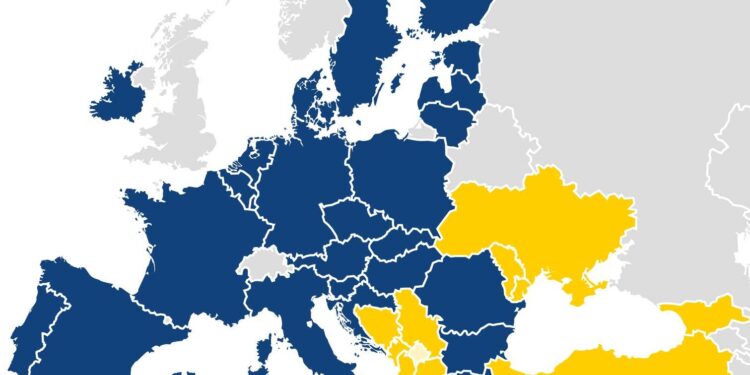The European Union is facing mounting pressure to respond decisively to Hungary’s controversial legislative measures that critics warn could “effectively outlaw free press” within the country. As concerns grow over media freedoms under Prime Minister Viktor Orbán’s government, international watchdogs and opposition voices are calling on EU institutions to take urgent action to uphold democratic principles and safeguard independent journalism in Hungary. This development marks a critical test for the EU’s commitment to fundamental rights amidst an escalating crackdown on dissent and press freedom in one of its member states.
EU Faces Mounting Pressure to Address Press Freedom Crisis in Hungary
The European Union is coming under intensified scrutiny as Hungary advances legislative measures that critics say will severely undermine press freedom in the country. These proposed laws are perceived as an attempt to tighten government control over independent media outlets, effectively silencing dissenting voices and restricting the flow of unbiased information. Several EU members and international watchdogs have voiced concerns that this move could set a dangerous precedent, threatening the foundational democratic values the union upholds.
In response to the escalating situation, calls for urgent intervention have gained momentum, with demands for the European Commission to implement stricter monitoring mechanisms and potential sanctions. Activists and journalists highlight several key consequences:
- Increased censorship: Limits on critical reporting and investigative journalism.
- Media consolidation: Government-friendly firms gaining disproportionate media presence.
- Public misinformation: Growing state propaganda undermining public trust.
| Aspect | Impact | EU Response |
|---|---|---|
| Legislative Controls | Restricts journalistic independence | Calls for legal review |
| Media Ownership | Favoritism towards pro-government networks | Investigations underway |
| Censorship Risks | Silencing opposition voices | Pressure for EU-wide safeguards |
Implications of Hungary’s Legislative Moves on Media Independence Explored
The recent legislative measures proposed by Hungary have ignited widespread concern regarding the future of media freedom within the country. Critics argue these moves aim to impose stringent controls and censorship mechanisms, essentially dismantling the pluralism and independence of the press. Journalists and civil rights groups warn that such regulations could be weaponized to suppress dissenting voices and limit public access to unbiased information. Central to the debate is the fear that media outlets may be forced to comply with state-driven narratives or face punitive repercussions, fundamentally altering Hungary’s democratic landscape.
Key concerns highlighted by watchdogs include:
- Vague legal definitions enabling arbitrary enforcement
- Increased governmental oversight of editorial content
- Potential criminalization of independent journalism
- Heightened risks of self-censorship within newsrooms
| Aspect | Projected Impact |
|---|---|
| Legislative Clarity | Ambiguous, enabling wide governmental discretion |
| Freedom of Expression | Severely curtailed, risking chilling effects |
| Media Ownership | Consolidation favoring pro-government entities |
Calls for Concrete EU Measures to Protect Journalistic Rights and Democracy
The recent developments in Hungary have sparked urgent demands from media watchdogs and human rights organizations across the continent. With legislative proposals threatening to curb independent journalism and stifle dissent, pressure is mounting on EU institutions to implement concrete actions that safeguard press freedom as a cornerstone of democracy. Advocates emphasize that tolerance for regulatory rollbacks endangers not only journalistic independence but also the wider democratic framework within member states.
Calls are focused on a multifaceted approach, urging the EU to consider measures including:
- Targeted sanctions against individuals undermining media pluralism;
- Establishment of an early-warning mechanism to monitor threats to press freedom;
- Increased funding for independent journalism initiatives at risk;
- Stricter review of national legislation conflicting with EU democratic standards.
| Proposed EU Measures | Potential Impact |
|---|---|
| Sanctions on government officials | Pressure to reverse restrictive laws |
| Early-warning system | Faster response to media suppression |
| Funding for independent media | Strengthened journalistic resilience |
| Legislative audits | Alignment with EU democratic values |
Insights and Conclusions
As concerns mount over Hungary’s proposed legislation aimed at severely restricting press freedom, calls for decisive action from the European Union have intensified. Observers warn that allowing such measures to proceed unchecked could undermine democratic values and set a troubling precedent within the bloc. With the stakes high, the EU faces mounting pressure to uphold its commitment to free expression and ensure that member states adhere to the fundamental principles enshrined in the union’s charter. The coming weeks will be critical in determining whether Brussels can effectively respond to what many see as an alarming threat to independent journalism in Hungary.
















